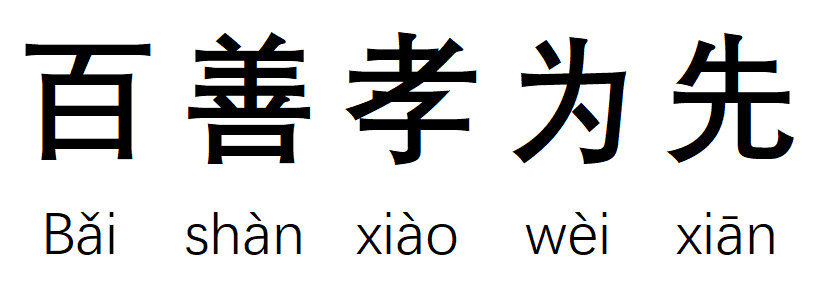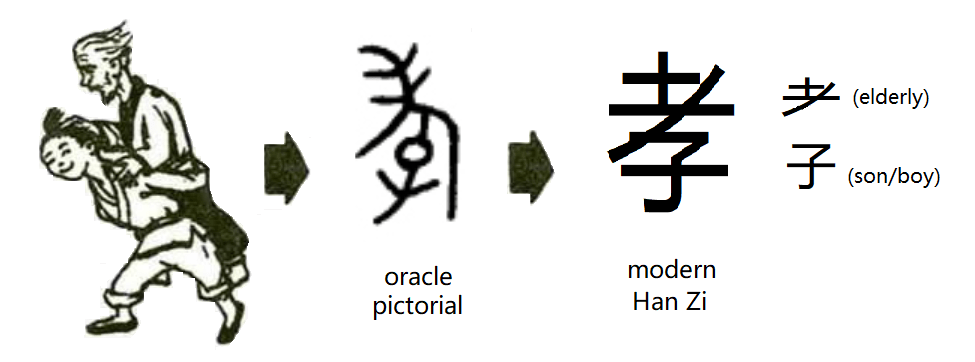Filial Piety is the core Chinese Family Ideology. It is a foundational value in Chinese culture, forming the basis of family structure and behaviour. As the saying goes, “Filial piety comes first among all virtues.” This virtue lies at the heart of Chinese family values.

What is Filial Piety?
In Chinese, filial piety is pronounced “Xiào” (孝). Some may say that it encompasses love, respect, care, and obedience toward one’s parents, elderly, as well as the family members. While these interpretations are accurate, but filial piety represents even more within the Chinese context.
To better understand the significance of filial piety, we can also examine what actions are considered Unfilial. Understanding these forbidden acts helps illuminate Chinese culture and its behavioural standards.
What is Unfilial in Chinese Culture?
The Chinese believe, “There are three ways to be unfilial, but the worst is to have no descendants.” This statement highlights three actions that are particularly frowned upon in a Chinese family:
- “Failing to Support Parents and Ancestors”: This includes providing financial, emotional, and physical support when needed.
- “Failing to Speak-out Against Parents’ Wrongdoings”: Failing to voice concerns about a parent’s misbehaviour can lead to harm to their reputation. This could have been avoided if the child had intervened earlier.
- “Failing to Have a Male Descendant”: This act is viewed as a significant failure in continuing the family legacy.
The essence of filial piety revolves around caring for parents, elderly, and ancestors.
The ancient oracle pictorial character for filial piety visually represents this concept: it depicts a young person supporting the elderly.

The character of “Xiào” has evolved into the modern Han Zi writing, which consists of two components. The top part symbolizes “elderly,” supported by the bottom part representing “son” or “boy.”
The Three Levels of Filial Piety
The concept of filial piety has existed for approximately 4,000 years, but signified by Zhou Gong during the Western Zhou Dynasty. The concept further elevated around 2,500 years ago through teachings of Confucius (Kong Qiu/Kong Zi, 551 B.C. – 479 B.C.). There are three levels of filial piety in a family:
- Highest Level: Making one’s parents respected.
- Second Level: Avoiding actions that would disgrace one’s parents’ reputation.
- Third Level: Providing financial, emotional, and practical support to parents.
The first two levels emphasize the importance of maintaining a good reputation for the family, thereby encouraging children to behave appropriately. To uphold the family legacy, all sons carry the responsibility of ensuring male descendants.
The third level of filial piety is further divided into three categories based on proximity:
– Best children live with their parents.
– Second-best children live nearby to their parents.
– The Third live far away, although they still supporting the parents.
It is often suggested that children living close to their parents may earn less, while those who live farther away might earn more and provide better financial support. However, children who reside with their parents, though possibly earning less, are often seen as the best caregivers. They demonstrate patience and thoughtfulness towards the elderly.
Due to the deep-rooted value of filial piety in Chinese culture, it is common to see three generations living under one roof. This arrangement reflects a strong sense of responsibility. Larger family units, with several second-generation siblings and their children living with their grandparents, are typical.
Unquestioning Filial Piety/ Blind Obedience [愚孝]
It is essential to differentiate true filial piety from what is known as “unquestioning filial piety” or “blind obedience.” When the focus is solely on pleasing parents, it can lead to situations where children support their parents blindly, even in unethical circumstances. This can inadvertently harm the parents’ reputation, thereby violating the principle of unfilial conduct.
We acknowledge that some parents may treat their children unfairly, particularly in traditional Chinese families that prioritize sons over daughters. Children should feel empowered to address these unfair treatments and rectify their parents’ mistakes. Remaining silent may further damage the parents’ reputation.
Similarly, when parents are interacting with the public and society. It’s important for children to feel empowered to speak up if they notice their parents behaving unfairly or unethically. Voicing concerns can help correct any mistakes. Remaining silent could ultimately harm the parents’ reputation even further.
In ancient times, navigating the balance between honouring one’s parents and speaking out against wrongdoing was particularly challenging. It is due to the strong cultural emphasis on filial piety.
Filial Piety is the Consensus in Chinese community
We must recognize that there is no definitive guide to the teaching of filial piety, even among students. Schools typically teach the notion and concept, but a student should grasp the idea through examples of unfilial actions and the different levels of filial piety.
In fact, understanding the concept of filial piety often comes more from family and societal influences. I personally know some elderly individuals from one or two generations before me, who did not receive much formal education. They practiced filial piety in their daily lives just as effectively as others. Filial piety is embedded in the fabric of Chinese society.
To help society better understand this value, there is a collection of stories known as the “Twenty-four Filial Piety Stories”. This stories are commonly included in school teachings.
Twenty-four Filial Piety Stories
Filial piety is a fundamental value in Chinese culture, and every pupil attending a Chinese school learns its importance. A well-known collection that highlights this value is the “Twenty-four Filial Piety Stories.”

This series presents twenty-four different narratives that demonstrate the significance of filial piety. Some of these tales are historical, and others are legendary, dating back several thousand years. While it isn’t necessary to remember all the details, the overarching message about the merits of filial piety is clear. In Chinese culture, filial piety transcends mere rules. It is a deeply ingrained belief system that emphasizes respect, love, responsibility within the family and beyond.
If you are interested in learning more about the “Twenty-four Filial Piety Stories,” please visit the link here. You will find an external resource with the English translation for a more comprehensive understanding.
It is common for students to present some of these stories on stage. There are various other ways to promote and enhance the value of filial piety. For example, through pictures or creative drawings, and in papercutting art, etc. In Malaysia, there are “24 Filial Piety Stone Sculptures” available for public viewing.
Filial Piety: The Cornerstone of Chinese Culture
Filial piety is indeed the cornerstone of Chinese culture, emphasizing respect, obedience, care for one’s parents and ancestors. This virtue shapes family dynamics and social structure, extending beyond simple obedience to encompass deep love and reverence. Filial piety is considered essential for maintaining family harmony and social stability.
This ideology strengthens family bonds, reinforces clear hierarchies, prioritizes harmony and continuity across generations. In Chinese culture, families often place collective needs above individual desires, promoting cooperation, mutual support, and unity. Traditional Chinese households typically follow a hierarchical structure, where the father or eldest male is the leader. They often holding the highest authority.
Filial Piety in Modern Society
At the beginning of this article, I posed the question: What is filial piety? Does it encompass love, respect, care, and obedience towards one’s parents?
Well, let us reflect on this ancient Chinese saying: “My body, skin, and hair are gifts from my parents, so I dare not harm them.”
How about that? This phrase highlights the deep appreciation and indebtedness the ancient Chinese feel towards the parents and underscores their significance in lives. It conveys a meaning that goes beyond our general interpretation of filial piety.
However, the understanding of filial piety has evolved over time. While traditional ideals remain influential, modernization and globalization have led to evolving interpretations of filial piety. It is now greater emphasis on mutual respect rather than strict obedience. Balancing traditional filial piety with modern values and individual autonomy can sometimes cause conflicts, not only in Western societies but surprisingly also within China, the origin of the ideology.
Over the past 50 years, China has experienced significant economic prosperity, which has transformed family structures. Urbanization has led many younger individuals to move to cities, where they establish families away from their original homes. This urban shift, coupled with the One-Child Policy (1979-2015), has fundamentally altered family dynamics. Grandparents often move in with their only child in urban areas to help care for grandchildren. As a result, familial habits and schedules have shifted from being parent-centric to grandchild-centric, focusing on the grandchildren’s education and activities.
Let us not forget the Chinese who live outside China, like me. As much as we would like to continue our traditions, we are all facing challenges in our respective countries in their social context, all around the world.
Conclusion on Filial Piety – The Chinese Core Family Ideology
I believe that the ancient concept of filial piety has evolved to be more accommodating to the modern world and globalization, yet the core value of “Xiào” (filial piety) towards parents remains intact. We should always remember to care for our parents, proactively spend valuable time with them. We should also provide financial support as much as possible, even if modern life presents challenges.
As the Chinese saying goes, “The tree wants to be still, but the wind does not stop. The son wants to take care of his parents, but they are no longer there.” Our parents age day by day, and we must not regret any inability to fulfil our filial duties while they are still alive. Ultimately, we embrace this responsibility willingly, not out of obligation.
Filial Piety and me
Let me share a bit about my family. We have four siblings: I am the eldest brother, with one younger brother and two younger sisters. I left my village for university studies in the capital, have continued to live and work there, alongside my spouse with three children. I consider myself fortunate that my siblings live with my parents and take good care of them, which eases my concerns. I owe to them a favour.
Regarding my three-children, filial piety remains the core ideology of our family and an important teaching for them. However, as modern society evolves, I may not insist that my children to stay with me in the future, nor will I pressure them to have children. Although I will encourage them to do so.
Ultimately, I believe it is important to emphasize mutual respect and strong family bonds.
